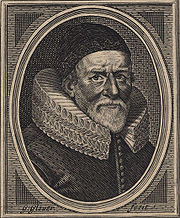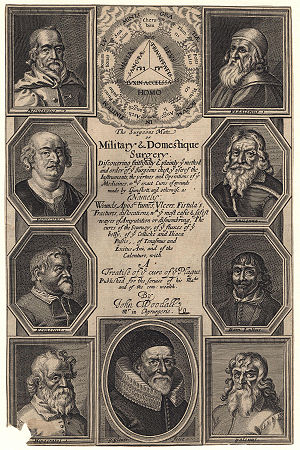
John Woodall
Encyclopedia

Surgeon
In medicine, a surgeon is a specialist in surgery. Surgery is a broad category of invasive medical treatment that involves the cutting of a body, whether human or animal, for a specific reason such as the removal of diseased tissue or to repair a tear or breakage...
, Paracelsian chemist, businessman, linguist and diplomat. He made a fortune through the stocking of medical chests for the East India Company
British East India Company
The East India Company was an early English joint-stock company that was formed initially for pursuing trade with the East Indies, but that ended up trading mainly with the Indian subcontinent and China...
and later the armed forces of England. He is remembered for his authorship of The Surgeon's Mate which was the standard text to advise ships surgeons on medical treatments while at sea and contains an advanced view on the treatment of scurvy
Scurvy
Scurvy is a disease resulting from a deficiency of vitamin C, which is required for the synthesis of collagen in humans. The chemical name for vitamin C, ascorbic acid, is derived from the Latin name of scurvy, scorbutus, which also provides the adjective scorbutic...
.
Life
Woodall was the son of Richard Woodall of WarwickWarwick
Warwick is the county town of Warwickshire, England. The town lies upon the River Avon, south of Coventry and just west of Leamington Spa and Whitnash with which it is conjoined. As of the 2001 United Kingdom census, it had a population of 23,350...
, and was apprenticed around the age of 16 or 17 to a London barber surgeon
Barber surgeon
The barber surgeon was one of the most common medical practitioners of medieval Europe - generally charged with looking after soldiers during or after a battle...
. He did not finish his apprenticeship but gained experience from the age of nineteen in 1589 as a surgeon with Lord Willoughby's regiment on its expedition to support the Protestant Henry IV of France
Henry IV of France
Henry IV , Henri-Quatre, was King of France from 1589 to 1610 and King of Navarre from 1572 to 1610. He was the first monarch of the Bourbon branch of the Capetian dynasty in France....
and King of Navarre in his campaign against the Catholic League of Normandy
Catholic League (French)
The Catholic League of France, sometimes referred to by contemporary Roman Catholics as the Holy League, a major player in the French Wars of Religion, was formed by Duke Henry of Guise in 1576...
. He returned in 1590.
Woodall is known to have then lived and worked as a surgeon in Polonia
Poland
Poland , officially the Republic of Poland , is a country in Central Europe bordered by Germany to the west; the Czech Republic and Slovakia to the south; Ukraine, Belarus and Lithuania to the east; and the Baltic Sea and Kaliningrad Oblast, a Russian exclave, to the north...
and Stade
Stade
Stade is a city in Lower Saxony, Germany and part of the Hamburg Metropolitan Region . It is the seat of the district named after it...
, a Hanseatic
Hanseatic League
The Hanseatic League was an economic alliance of trading cities and their merchant guilds that dominated trade along the coast of Northern Europe...
port near Hamburg
Hamburg
-History:The first historic name for the city was, according to Claudius Ptolemy's reports, Treva.But the city takes its modern name, Hamburg, from the first permanent building on the site, a castle whose construction was ordered by the Emperor Charlemagne in AD 808...
, Whilst there he was occasionally employed as a German
German language
German is a West Germanic language, related to and classified alongside English and Dutch. With an estimated 90 – 98 million native speakers, German is one of the world's major languages and is the most widely-spoken first language in the European Union....
interpreter by visiting English ambassadors.
In 1599 he was admitted to the Barber-Surgeons Company of London
Royal College of Surgeons of England
The Royal College of Surgeons of England is an independent professional body and registered charity committed to promoting and advancing the highest standards of surgical care for patients, regulating surgery, including dentistry, in England and Wales...
as a freeman but continued to live mainly on the continent in Holland, until 1603 when he took up residence in Wood Street, London. He was able to offer treatment to victims of the plague epidemic. At unspecified times in his life he contracted bubonic plague
Bubonic plague
Plague is a deadly infectious disease that is caused by the enterobacteria Yersinia pestis, named after the French-Swiss bacteriologist Alexandre Yersin. Primarily carried by rodents and spread to humans via fleas, the disease is notorious throughout history, due to the unrivaled scale of death...
and survived, writing of this, "...for I had it twice, namely at two severall Plague times in my Groyne."
In 1604 James I of England
James I of England
James VI and I was King of Scots as James VI from 24 July 1567 and King of England and Ireland as James I from the union of the English and Scottish crowns on 24 March 1603...
sent an embassy, led by Sir Thomas Smith, Governor of the East India Company, to Poland
Poland
Poland , officially the Republic of Poland , is a country in Central Europe bordered by Germany to the west; the Czech Republic and Slovakia to the south; Ukraine, Belarus and Lithuania to the east; and the Baltic Sea and Kaliningrad Oblast, a Russian exclave, to the north...
and possibly to Russia
Russia
Russia or , officially known as both Russia and the Russian Federation , is a country in northern Eurasia. It is a federal semi-presidential republic, comprising 83 federal subjects...
. Woodall was included for his knowledge of the region and command of the languages. The association with Smith was a fruitful one for Woodall, for in 1612 Sir Thomas appointed Woodall to serve as Surgeon General to the East India Company. His duties were described as follows:
- "The Said Chiurgion and the Deputy shall have a place of lodging in the Yard, where one of them shall give Attendance every working day from morning until night, to cure any person or persons who may be hurt in the Service of this Company and the like in all their Ships, riding at Anchor at Deptford and Blackwell, and at Erith, where he shall also keepe a Deputy with his chest furnished, to remaine there continually until all the said ships have sayled and appointing fit and able Surgeons and Surgeon's Mates for their ships and services, as also the fitting and furnishing of their Chests with medicines and other appurtenances thereto."
Woodall's career then progressed rapidly with election as a surgeon at St. Bartholomew's Hospital in 1616 where he was a colleague of Sir William Harvey
William Harvey
William Harvey was an English physician who was the first person to describe completely and in detail the systemic circulation and properties of blood being pumped to the body by the heart...
. He was promoted to examiner in the Barber-Surgeons Company in 1626, to warden in 1627 and then master in 1633.
He suffered a setback, however, in 1625 when he served a writ on Sir Thomas Merry, a servant of the King who owed Woodall money. For his effrontery to royal privilege, the Lord Steward
Lord Steward
The Lord Steward or Lord Steward of the Household, in England, is an important official of the Royal Household. He is always a peer. Until 1924, he was always a member of the Government...
had Woodall imprisoned. He was briefly released to supervise surgeon's chests for the next fleet at the request of the East India Company, but was then jailed once more. He was only freed when he issued a contrite apology.

Privy council
A privy council is a body that advises the head of state of a nation, typically, but not always, in the context of a monarchic government. The word "privy" means "private" or "secret"; thus, a privy council was originally a committee of the monarch's closest advisors to give confidential advice on...
decided to pay the Barber-Surgeons Company fixed allowances to furnish medical chests for both the army and navy, and Woodall was appointed to supervise this scheme in addition to his long-standing similar commitment to the East India Company.
He was eventually dismissed by the East India Company in 1635 for financial reasons, but retained a monopoly on supplying the Company's medical chests until he died in 1643, aged 73.
The Surgeon's Mate
The first edition of The Surgeon's Mate was published in 1617. Later editions contained treatise on- "for the better curing of Wounds made by Gunshot"
- "of that most fearefull and contagious Disease called the Plague"
- and "A Treatise of Gangrena... chiefly for the Amputation or Dismembering of any Member of the mortified part."
Pages 160-176 to are devoted to "the scurvy called in Latine Scorbutum."
- We have in our owne country here many excellent remedies generally knowne, as namely, Scurvy-grasse, Horse-Reddish roots, Nasturtia Aquatica, Wormwood, Sorrell, and many other good meanes... to the cure of those which live at home...they also helpe some Sea-men returned from farre who by the only natural disposition of the fresh aire and amendment of diet, nature herselfe in effect doth the Cure without other helps." At sea, he states that experience shows that "the Lemmons, Limes, Tamarinds, Oranges, and other choice of good helps in the Indies... do farre exceed any that can be carried tither from England.

